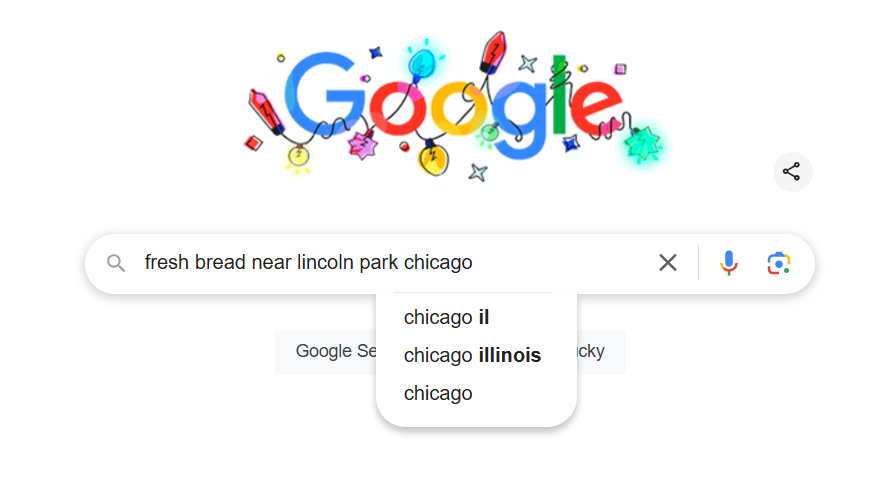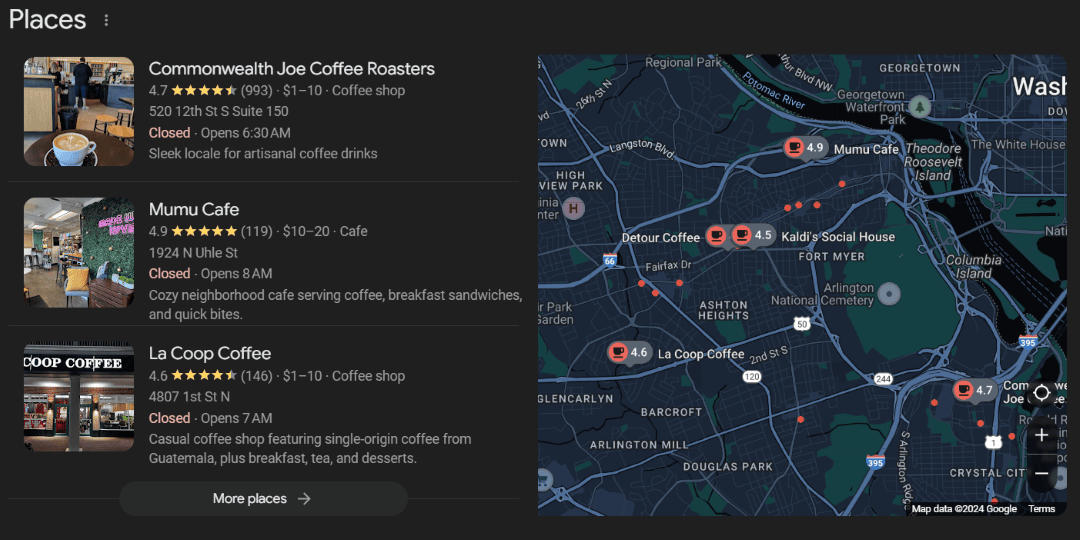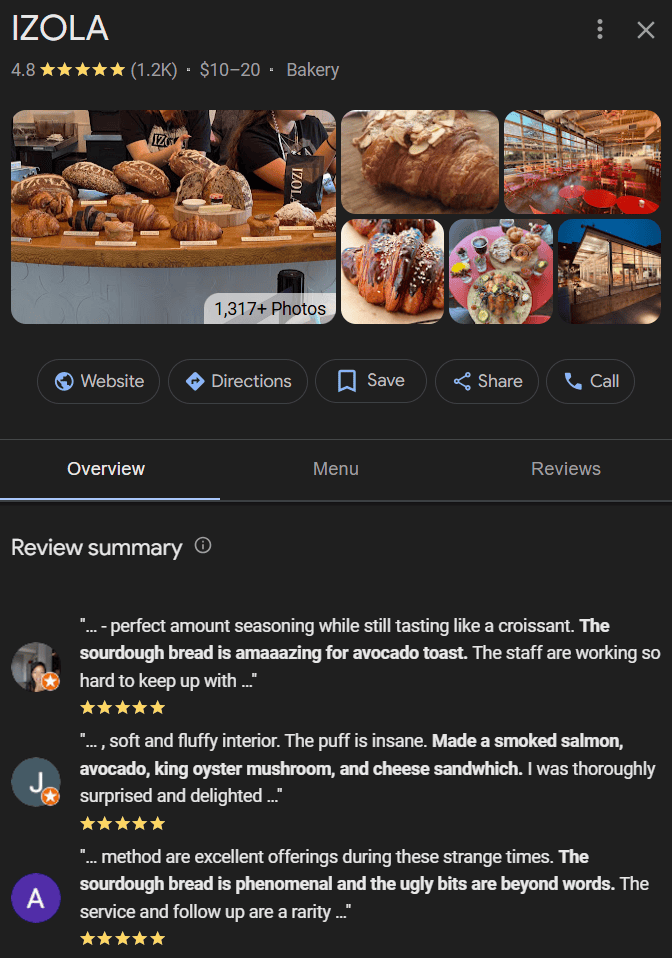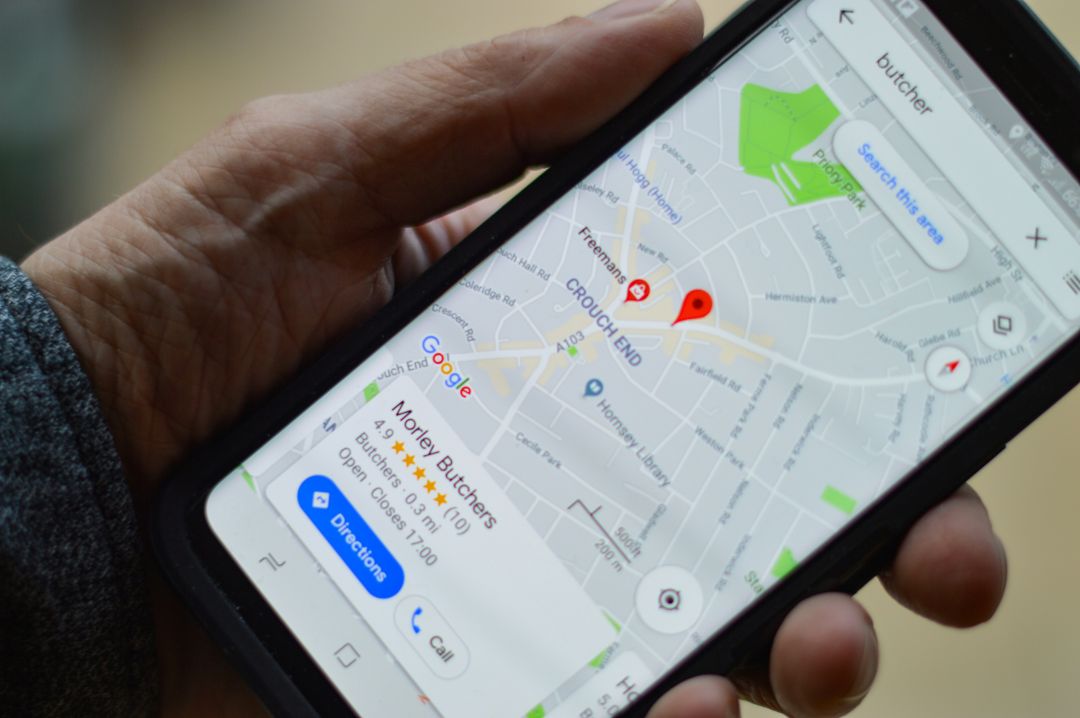Businesses with a local presence not only have to compete with their neighbors but also with online companies vying for attention. That’s where local SEO comes into play.
Local SEO, or local search engine optimization, improves a business’s visibility in search engine results for location-specific queries. In simpler terms, it helps your business show up when people search for services or products “near me” or in a specific city or region.

How Local SEO Works
Search engines like Google consider several factors when deciding which businesses appear in local search results. These include how relevant your business is to the search query, its proximity to the searcher’s location, and its overall prominence or reputation.
Local SEO optimizes your online presence to rank better for these factors, ensuring your business appears in front of potential customers nearby.
For example, if someone searches for “bakeries near me,” Google displays a list of coffee shops based on proximity, reviews, and other information. Businesses with well-optimized local SEO are more likely to secure a spot on this list.

Key Elements of Local SEO
To understand local SEO better, let’s break it down into its core components:
- Google Business Profile. Your Google Business Profile, formerly Google My Business or GMB, is a cornerstone of local SEO. This profile lets your business appear on Google Maps and in local search results. It includes details like your address, phone number, hours of operation, website link, and customer reviews. Keeping this information accurate and up to date is crucial.
- NAP Consistency. Making sure your NAP (Name, Address, and Phone Number) information is consistent across all online platforms, such as your website, directories, and social media profiles, builds trust with search engines. Inconsistent information can mislead both search engines and potential customers, which may negatively impact your local rankings.
- Local Keywords. Keywords are the backbone of any successful SEO strategy, and local SEO is no different. Incorporating location-specific keywords into your website content, meta descriptions, and headings helps search engines understand where your business operates. For example, a bakery in Chicago might use keywords like “best bakery in Chicago” or “fresh bread near Lincoln Park.”
- Reviews and Ratings. Customer reviews not only influence potential customers but also impact your search rankings. Search engines favor businesses with high ratings and positive reviews. Encouraging happy customers to leave reviews and responding to them—whether positive or negative—demonstrates that your business values feedback.
- Local Citations. A local citation refers to any online mention of your business’s name, address, and phone number. These citations can appear in directories like Yelp, Yellow Pages, or industry-specific platforms. Consistent and accurate citations boost your credibility with search engines and customers.
- Mobile Optimization. Since most local searches occur on mobile devices, having a mobile-friendly website is essential. Features like responsive design, quick loading times, and intuitive navigation enhance the user experience and can boost your search rankings.
- Local Link Building. Backlinks, or links from other websites to yours, signal to search engines that your business is reputable. Local link building involves earning backlinks from other businesses, organizations, or influencers in your community. Collaborations, sponsorships, or local news features can help achieve this.

Benefits of Local SEO
Optimizing for local SEO brings multiple advantages for businesses targeting a regional audience:
- Increased Visibility: Local SEO ensures your business appears in local search results and on Google Maps, making it easier for potential customers to find you.
- Higher Foot Traffic: For brick-and-mortar businesses, improved visibility often translates to more foot traffic as customers discover you online and visit your location.
- Better Customer Engagement: Features like Google Business Profile allow customers to engage directly by calling, messaging, or leaving reviews.
- Cost-Effective Marketing: Local SEO targets specific audiences, meaning your efforts are focused on reaching people most likely to convert, reducing wasted marketing spend.
How to Get Started with Local SEO
If you’re new to local SEO, here’s a step-by-step guide to help you begin:
Step 1: Claim and Optimize Your Google Business Profile
Claiming your Google Business Profile is free and relatively simple. Once claimed, ensure your profile is fully optimized with accurate business information, high-quality photos, and regular updates. Use the description field to incorporate local keywords naturally.
Step 2: Build and Maintain Citations
List your business on reputable local directories, ensuring your NAP details match across all platforms. Tools like Moz Local and BrightLocal can help manage your citations efficiently.
Step 3: Create Location-Specific Content
Develop content tailored to your local audience. This could include blog posts about local events, guides specific to your area, or customer success stories. Highlighting your connection to the community helps build trust and engagement.
Step 4: Encourage Reviews
Encourage happy and satisfied customers to leave reviews on platforms like Google and Yelp. Responding to these reviews demonstrates that you value their feedback and prioritize their experience.
Step 5: Monitor Your Local SEO Performance
To monitor performance, you can use tools like Google Analytics, Google Search Console, and local SEO-specific platforms to track your progress. Monitor metrics such as website traffic, keyword rankings, and conversion rates to refine your strategy.
Common Challenges in Local SEO
While local SEO is a powerful tool, it comes with its challenges. Competition can be fierce, especially in densely populated areas. Maintaining accurate information across multiple platforms can also be time-consuming. Additionally, search engine algorithms are constantly evolving, requiring businesses to stay up to date with best practices.
Why Local SEO Matters
Local SEO isn’t just for small businesses; it’s essential for any company looking to attract customers in a specific geographic area. Whether you’re a restaurant, law firm, or retail store, a strong local SEO strategy ensures you remain visible and competitive in your local market.
How We Can Help
Local SEO is essential for businesses looking to connect with nearby customers and stand out in their community. By optimizing for local search, you can boost visibility, attract more foot traffic, and drive meaningful engagement. If you’re ready to enhance your local presence, our enterprise SEO experts are here to help—contact us to get started!





